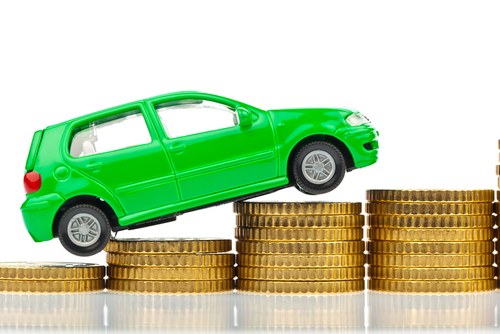One of the luxuries of modern life is having a vehicle that will transport us just about wherever we want to go. There is no need to walk anywhere, or ride horses, or take days just to go a few miles. But have you ever sat down to figure out what it costs to own, operate, and maintain a car? There are costs that are upfront and many more that are ongoing, the totals are often a lot more than many people realize.
When you go to buy a car, the biggest thing is the sticker price. A new car will cost upwards of $30,000. These costs are enough that most people have to get a loan just to afford the vehicle. In addition to just the cost of paying for the car, dealers generally have some hidden paperwork fees. Once you have the car you will need to have some title work done, and get license plates for the car.
That is where the ongoing costs begin. The car will need license plates, and those plates will need to be renewed each year. If you finance the purchase, there will be interest charges each year. The car will need to be insured, and maintained with regular oil changes and cleanings. And perhaps the biggest ongoing cost of all is filling it up with gas regularly.
How does that all work out? Suppose instead of buying a new car you decide to use public transportation instead, you could save quite a bit of money. Right up front you would save $15,000 on the purchase of a new car (unless you bought a more expensive vehicle, in which case your savings would be even greater) and about $250 on paperwork fees. You would not spend $2,484 on interest charges on that loan (assuming 4% on a 4 year loan). Title and registration costs are around $200 in many places for the first year, and then $150 per year after that. Depending on your insurance carrier, the premiums for your vehicle could run you around $150 per month. The average person drives around 12,000 miles per year. If your vehicle gets 25 miles per gallon, that means you will burn through 480 gallons of gas in one year. That is $1,680 worth of fuel at $3.50 per gallon. If you forego the car you can see an upfront savings of $32,934 on the purchase and registering the vehicle, and an additional savings of $302.50 each month of being car free. This does not include the costs associated with oil changes, washing, and cleaning the interior, nor does it take into account those costs that pop up from time to time like repairs and replacing tires.
Without a car you will still need to get around. So even though you are saving over $300 per month, you will still need to spend money on public transportation. For those in bigger cities, you should be able to get around just fine. The Chicago Transit Authority charges just $86 for an unlimited monthly pass. Many other large cities are similar. Cars are nice, but they are expensive. If you make the commitment to go car free you will not only have an extra $16,692 in your pocket, and an extra $216 each month, but you will also be helping to reduce pollution and leave a cleaner earth for your heirs. That is something you can’t put a price tag on.
One of the luxuries of modern life is having a vehicle that will transport us just about wherever we want to go. There is no need to walk anywhere, or ride horses, or take days just to go a few miles. But have you ever sat down to figure out what it costs to own, operate, and maintain a car? There are costs that are upfront and many more that are ongoing, the totals are often a lot more than many people realize.
When you go to buy a car, the biggest thing is the sticker price. A new car will cost upwards of $30,000. These costs are enough that most people have to get a loan just to afford the vehicle. In addition to just the cost of paying for the car, dealers generally have some hidden paperwork fees. Once you have the car you will need to have some title work done, and get license plates for the car.
That is where the ongoing costs begin. The car will need license plates, and those plates will need to be renewed each year. If you finance the purchase, there will be interest charges each year. The car will need to be insured, and maintained with regular oil changes and cleanings. And perhaps the biggest ongoing cost of all is filling it up with gas regularly.
How does that all work out? Suppose instead of buying a new car you decide to use public transportation instead, you could save quite a bit of money. Right up front you would save $15,000 on the purchase of a new car (unless you bought a more expensive vehicle, in which case your savings would be even greater) and about $250 on paperwork fees. You would not spend $2,484 on interest charges on that loan (assuming 4% on a 4 year loan). Title and registration costs are around $200 in many places for the first year, and then $150 per year after that. Depending on your insurance carrier, the premiums for your vehicle could run you around $150 per month. The average person drives around 12,000 miles per year. If your vehicle gets 25 miles per gallon, that means you will burn through 480 gallons of gas in one year. That is $1,680 worth of fuel at $3.50 per gallon. If you forego the car you can see an upfront savings of $32,934 on the purchase and registering the vehicle, and an additional savings of $302.50 each month of being car free. This does not include the costs associated with oil changes, washing, and cleaning the interior, nor does it take into account those costs that pop up from time to time like repairs and replacing tires.
Without a car you will still need to get around. So even though you are saving over $300 per month, you will still need to spend money on public transportation. For those in bigger cities, you should be able to get around just fine. The Chicago Transit Authority charges just $86 for an unlimited monthly pass. Many other large cities are similar. Cars are nice, but they are expensive. If you make the commitment to go car free you will not only have an extra $16,692 in your pocket, and an extra $216 each month, but you will also be helping to reduce pollution and leave a cleaner earth for your heirs. That is something you can’t put a price tag on.








